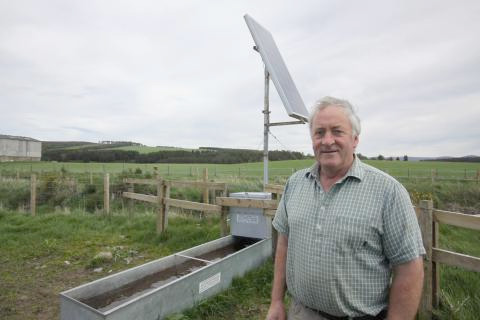
Paratuberculosis (Johne’s disease) is of welfare and production concern for cattle farms. A series of QMS funded workshops are being held across Scotland, showcasing how farmers may manage and reduce on-farm infection by developing a long term, strategic approach to control of the disease.
A Speyside farm, where the number of cases of Johne’s has greatly reduced since 2010, will be one of the case studies highlighted at a series of workshops taking place around the country.
Farm manager George Rae, along with the cattleman Colin Calder and shepherd Peter Tinney, run a suckler herd of 200 Aberdeen-Angus cross cows put to Limousin bulls at Ballintomb Farm in Speyside. The successful reduction of Johne’s cases at Ballintomb can be attributed to the adoption of a long-term strategy and vision which resulted in real progress on tackling the disease on the farm.
The farm is one of the case studies which will be reviewed at a series of workshops funded by Quality Meat Scotland (QMS) and the Scotland Rural Development Programme (SRDP) Skills Development Scheme.
The workshops are aimed at equipping farmers with a greater understanding of Johne’s management options and also showcasing practical examples of case studies from the previous project, Paraban. This initiative showed how different approaches taken by farms can be successful as long as key principles are applied.
Inverness-based SRUC (Scotland’s Rural College) epidemiologist Selene Huntley is coordinating the workshops. “Johne’s management involves a combination of culling and management decisions based on test results, and other interventions such as environmental management to limit the exposure of animals to Johne’s infection,” she said.
“Ballintomb Farm is an excellent example of how, despite the set-backs that inevitably happen as part of farming, by adopting a long term strategy and keeping a long-term vision, real progress can be made.”
Regular herd screening means Mr Rae can make early decisions on the management of test positive cases to minimise the risk of infection to the rest of the herd, particularly the young calves. Cows which test positive are isolated and culled as soon as possible. If the animal is in-calf she will be allowed to calve in a separate area and managed separately whilst nursing her calf. Calves from cows which test positive are not kept as replacements.
“Removing blood positives from the herd is one of the main ways for George to combat the spread of the disease. As this is an open herd, he strives to source replacements from herds with no known history of Johne’s to minimise the risk of buying in cows with the disease,” said Dr Huntley.
However, Mr Rae recognises that a “bigger picture” approach is also needed to combat Johne’s and he is addressing some of the other potential routes of infection on his farm.
The cows are kept outside all year round and the natural topography of the area means that free-running burns were previously one of the main sources of water for the stock grazing across the farm. In the absence of availability of fresh-piped water to much of the farmland, Mr Rae has worked with the Spey Catchment Initiative on the Allt Mor, Achnahannet Burn and River Dulnain enhancement project and improved the sources of water for his stock.
The aim of this project was to improve the water quality along these waterways as well as to enhance the habitat bordering them. Fencing off burns allows the protection of the water courses and environment from poaching by cattle hooves and minimises the risk of contamination of water courses (thought to be another possible way in which Johne’s could spread). He has also drained standing water areas and installed solar powered drinking troughs that pump fresh water from the river.
Although in the past Ballintomb had clinical cases (where the animals have exhibited symptoms of the disease such as weight loss or diarrhoea), in recent years early diagnosis has alleviated this. The annual whole herd screening has been simplified as a result of Mr Rae being a member of a Health Scheme and having a management plan for Johne’s in place with his vet.The workshops will involve SRUC, Glasgow University, Edinburgh University and the James Hutton Institute. The aim is to assist farmers across Scotland to identify the best way to control Johne’s disease under their specific management conditions.
Four workshops are soon to be held across Southern and Central Scotland:
Evening of May 28th, 2014 at 6.30 pm: Newton Stewart: The Crown Hotel, 102 Queen Street, Newton Stewart. DG8 6JW
Evening of May 29th, 2014 at 6.30 pm: Stirling: Stirling Management Centre, University of Stirling, Stirling. FK9 4LA
Further workshops are due to be held across Scotland throughout the year.
